In this day and age, with so many law firms eager to gain the attention of prospective clients, it certainly pays to go the extra mile in getting your business noticed.
Building and implementing a winning SEO strategy can make all the difference in your law firm standing out from the crowd or fading into the background, so it’s vital that you get your techniques right and gain yourself that all-important exposure.
Luckily, search engine optimisation is a great fit for those in the field of law – prospective clients need to gain trust in your organisation and demand to see evidence of your industry expertise before taking you on – and content marketing, in particular, makes for a perfect match when it comes to putting your business in the shop window for your target market.
But what strategies can be utilised in the pursuit of SEO success? And how can they be implemented in a way that drives traffic and wins clientele? Here’s a list of 22 actionable strategies designed to increase traffic, drive links and generate leads for your law firm.
1. Conduct keyword research and go local
Keywords make up the cornerstone of Search Engine Optimisation. Search engine results pages essentially compile the best matching keywords for the terms being searched – albeit with a few page authority checks thrown into the mix.
Effective keyword research is vital in any successful online enterprise. To be able to identify the sort of terms that users are searching for and effectively embedding them into your content is an excellent strategy for gaining the level of exposure that can give you an edge over your competitors.
Use tools like Ahrefs to find low-competition, high-volume keywords:
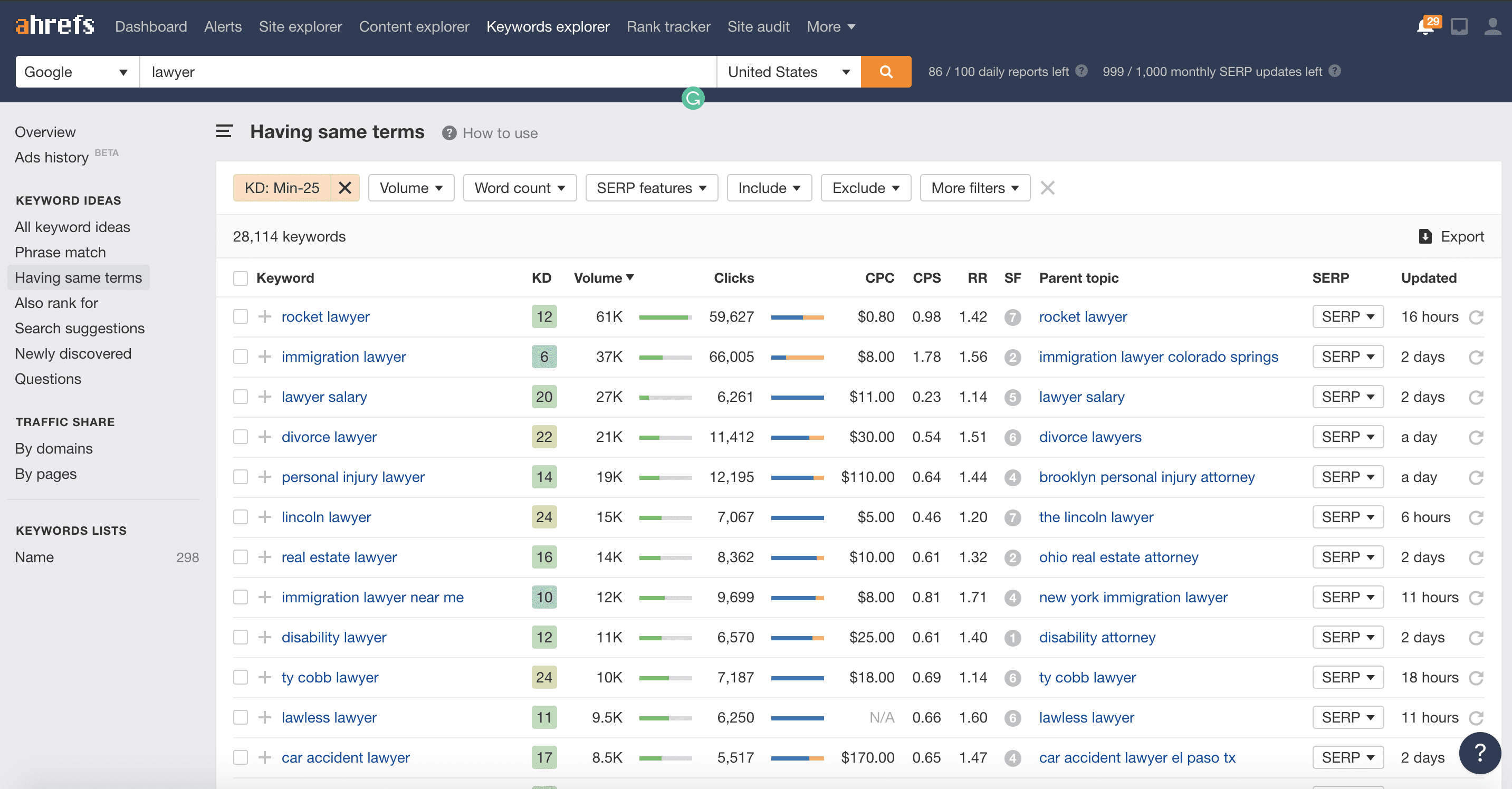
As a law firm, you gain the added advantage of having the ability to target more local keywords. If your firm is located in Norwich, be sure to make reference to your location within your content to ensure that you’ll rank highly on Google for your target audience.
2. Prioritise long-form quality content
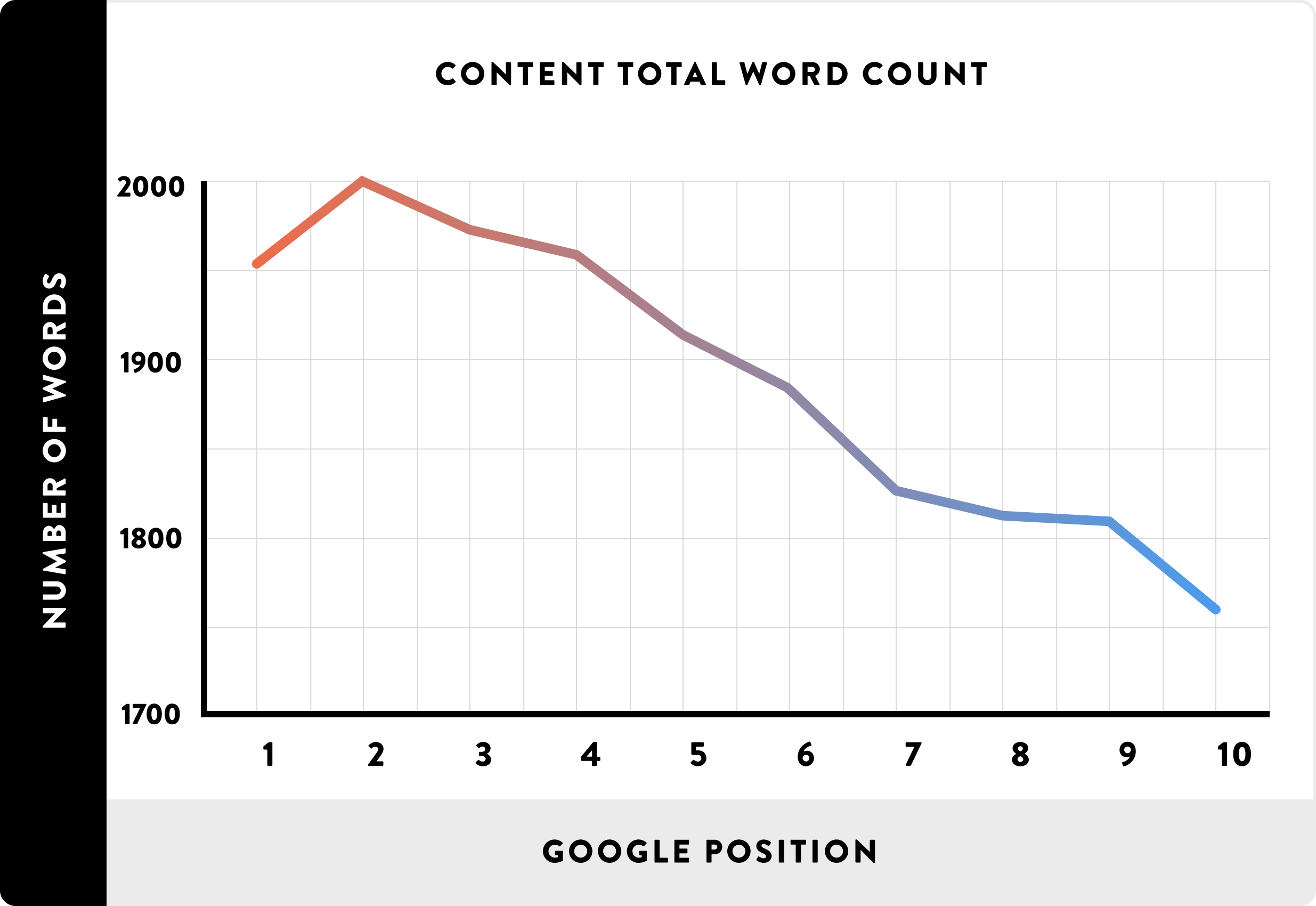
Image Source: Backlinko
There’s a strong correlation between long-form content and Google’s higher ranking pages. While it can feel like a time-consuming approach to creating articles and stories on your website, producing content that features around 2,000 words or more encourages users to stay on your pages for longer and carries more potential for embedding effective keywords. Long-form content also helps to provide a larger canvas for embedding both backlinks and internal links.
Be sure to focus on more in-depth articles. Doing so will not only improve your company’s SEO but will build further trust between yourself and your target market. As a law firm, it’s imperative that you demonstrate your industry expertise, and through high-quality long-form content, you can share your knowledge in a way that encourages higher volumes of traffic and better quantities of leads.
3. Technical SEO
Technical SEO is absolutely vital in ensuring that your content is as visible as possible to your prospective audience.
If a website’s technical SEO isn’t up to scratch, it doesn’t matter if its authors are publishing masterpiece after masterpiece on its pages – the content will be difficult to rank for.
It’s vital that you ensure your site has all the relevant SSL and site security certificates attached – you could have all of the right keywords positioned in all of the right places, but sadly it won’t amount to much if Google identifies your pages as a potential security risk.
Website performance is also imperative for your technical SEO. Slow page loading times are a common cause of ‘bouncebacks’ (where visitors click onto your website before navigating away instead of waiting any longer for it to appear on screen).
It’s important to test your pages to ensure that their loading times are as short as possible. There are plenty of options available if you’re looking to test the performance of your site, and Google has a particularly powerful engine for investigating the swiftness of your pages.
4. Place core practice areas in your main website navigation
Search engines like to get the low down on your website as quickly and easily as possible. By establishing what your law firm’s key practice areas are within your website navigation, you’re not only providing a useful reference point for visitors but also informing the likes of Google what your firm’s primary focuses are.
Failing to give due prominence to your core practice areas and burying such important pages deeper within your site will give Google the impression that the concentrations carry a lower priority for your company and will rank you lower in relevant searches.
Like the search engines perusing your pages, potential clients will be keen to know where your firm’s main focuses lie. Be sure to create a page for each of your core practice areas and make said pages easy for visitors to navigate to through clear internal linking on your home page. Try to avoid creating a single page that lists your core practices in order to prevent any ambiguity.
5. Get your site structure in check
Effective site structure forms the foundations of great SEO, and it’s vital to carry a clear layout that encourages internal navigation and positive user experience within their interactions with your pages.

SEO Results Partner, Propecta, offers their collective insights into the power that a strong sight structure holds: “The site navigation explains your brand, highlights your priorities, and helps guide visitors through the buying journey. Top-level pages usually provide general, high-level information for buyers in the awareness stage. As users progress through the journey—and deeper into your site structure—information becomes more specific. As a result, your website navigation design is an effective tool for lead nurturing and generation.”
Ensure that your website’s pages link together well. Essentially, it’s vital that all of your pages are intertwined and accessible through no more than two clicks, regardless of which page the visitor is on at the time.
6. Leverage Aggregator Sites (Avvo, Super Lawyers, Justia, etc.)
Law can be a frighteningly competitive field, with countless firms vying for prominence and comprising as many approaches as they can in order to give them an edge over their counterparts.
In such a congested field, wouldn’t it be nice to enlist other organisations to help pick up the slack and do some work for you? Aggregator websites like Avvo, Super Lawyers and Justia typically have free profiles and the option of taking out premium promoted pages that will guarantee your firm a higher ranking within said site’s search results pages.
Yes, search engines hold plenty of power when it comes to finding your target audience, but many users still turn to specialist aggregator websites when it comes to finding companies in an industry as vital as law – chiefly because there’s little room for taking chances with inferior firms.
Vitally, gaining a backlink from such esteemed aggregator sites will help to increase your own website’s organic search rankings – a vital component in underlining your aptitude in the legal sphere.
7. Embrace Accelerated Mobile Pages
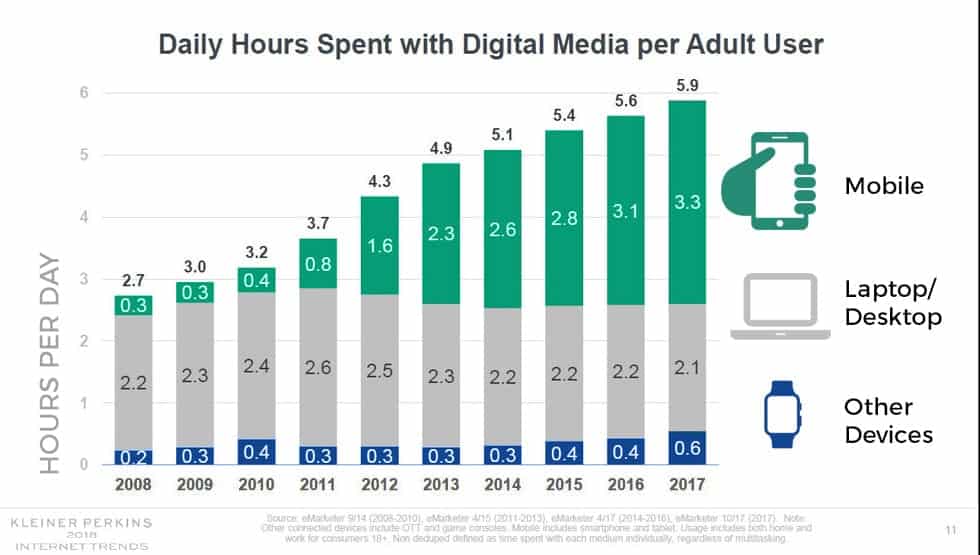
Image Source: Kenshoo
We’re an increasingly mobile society. The above chart illustrates the seismic shift in the prevalence of our browsing habits, and the onus, in turn, has shifted to businesses to keep up with our changing avenues for connectivity.
Accelerated Mobile Pages make for a great solution for businesses that are looking to cater to an increasingly mobile audience. With AMP, websites benefit from having much faster loading times for visitors looking to access its pages from mobile devices – thus significantly improving its overall user experience.
This enhanced usability will, in turn, reflect well in your search engine rankings. The lower level of bouncebacks owing to improved loading times will single-handedly aid your position on Google’s results pages when a relevant search is made.
8. Dedicate time to link building
Link building is the process of gaining backlinks to your website from external pages. Backlinks shoot up your website in organic results, hence driving more traffic back to the website. What your website would identify as a backlink, the referring site would probably know as an ‘outlink.’
Link building is absolutely vital to SEO. Having websites link back to your pages not only improves your business’s visibility on the world wide web but reaffirms your credibility in the eyes of Google.
It’s the beating heart of Search Engine Optimisation, and there are plenty of ways your law firm can build links that point to your content. Below is a short list of six excellent forms of link building for websites based in the field of law:
1. Skyscraper technique
The skyscraper technique is one of many link building strategies that was first made popular by Brian Dean of Backlinko, and it’s striking in its simplicity.
Essentially, the skyscraper technique is about finding link-worthy content and then producing something better yourself. You would then reach out to the right people and offer them your brand new high-value content.
As a law firm, all you need to do in order to conduct the skyscraper technique is to search for popular content like guides and specific industry tips that are relevant to the industry and your target market. Additionally, it’s worth hunting for existing pieces that feature prominent law-specific keywords before exploring how to beat it in terms of quality.
For example, if you see an existing article entitled ‘12 questions to ask before consulting a law firm’, take a moment to think about how to make the content better for your own website. Building a piece entitled ‘15 considerations to make before consulting a law firm’ immediately gives the reader more in terms of quantity and then the onus is on you to enhance your content’s quality above the competition.
2. Blogger Outreach
Located in a similar sphere to the increasingly popular ‘influencer’ campaigns in the marketing industry, blogger outreach is the act of reaching out to bloggers to market your product/content.
By outreaching to a successful blogger in order to create quality content on your behalf, you get to benefit from exposure to a large-scale audience with relative ease – and all at cost that will be negotiated between your law firm and the individual you’re attempting to reach an agreement with.
Although this approach may cost your business more money than the other approaches towards link building, it saves a notable amount of working hours that would be required to produce a quality post and dress it with enough SEO to ensure exposure.
It’s vital to be aware of the audience that you’re attempting to reach by receiving help of a blogger. Fortunately, there are plenty of influential figures that cover the facets of law, barrister work and hypothetical legal practices, so take a moment to consider the type of content that you’re looking to craft and outreach to reputable bloggers accordingly.
3. Broken Link Building
A particularly cunning method of link building can be conducted by searching for existing broken links in other websites’ published content and offering your own content as a suitable replacement. Use Chrome extention “Check My Links“.
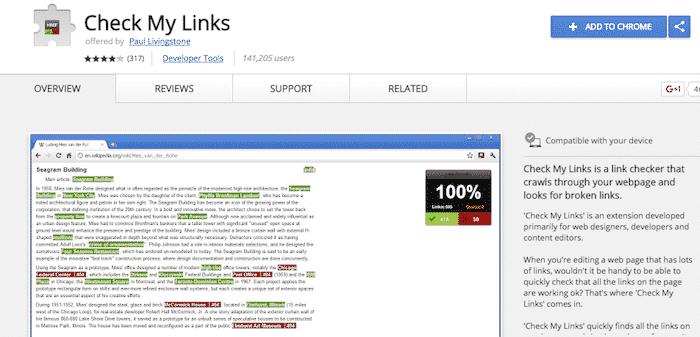
Broken link building is a very efficient and time-effective method of gaining valuable backlinks to your pages, and typically carries a higher success rate than other link building methods due to the fact that you’re offering a solution to a specific on-site problem.
Be sure to look for content online that could benefit from your law firm’s inclusion. Lists recommending the type of content that your firm produces is a great place to start, but you could also branch away from the law industry should a relevant article appear – it could make for an effective way of reaching new audiences.
To conduct broken link building, simply reach out to the website’s editor or owner and inform them that they have a broken link – then explain that your website has a similar piece of content that you believe is of a higher quality.
4. Guest blog your way to prominence
The value that lies in guest blogging may not be immediately clear to some industry practitioners – after all, why should your hard work be featured on the pages of an external website? But in reality, guest blogging opens many doors for websites looking to gain a little exposure.

The great thing about guest blogging is that your content can be placed directly under the noses of a considerably larger audience than your law firm currently reaches. Provided your article is strong enough, said audience would then be encouraged to click-through to your pages to peruse more content – thus increasing your traffic.
The way guest blogging works is that you think of a topic and pitch it to a higher ranking blog/publication that may be interested in publishing it. Guest blogging is a great way of expanding your audience by utilising 3rd party blogs.
Make sure you invest some time in identifying your target audience before conducting guest blogging. It’s by getting into the minds of those who are most likely to become clients that you can locate the types of publications they may be reading online and reaching out to its respective authors.
5. Resource pages link building
A simple but effective form of link building can be performed by getting your business listed on external resource pages.
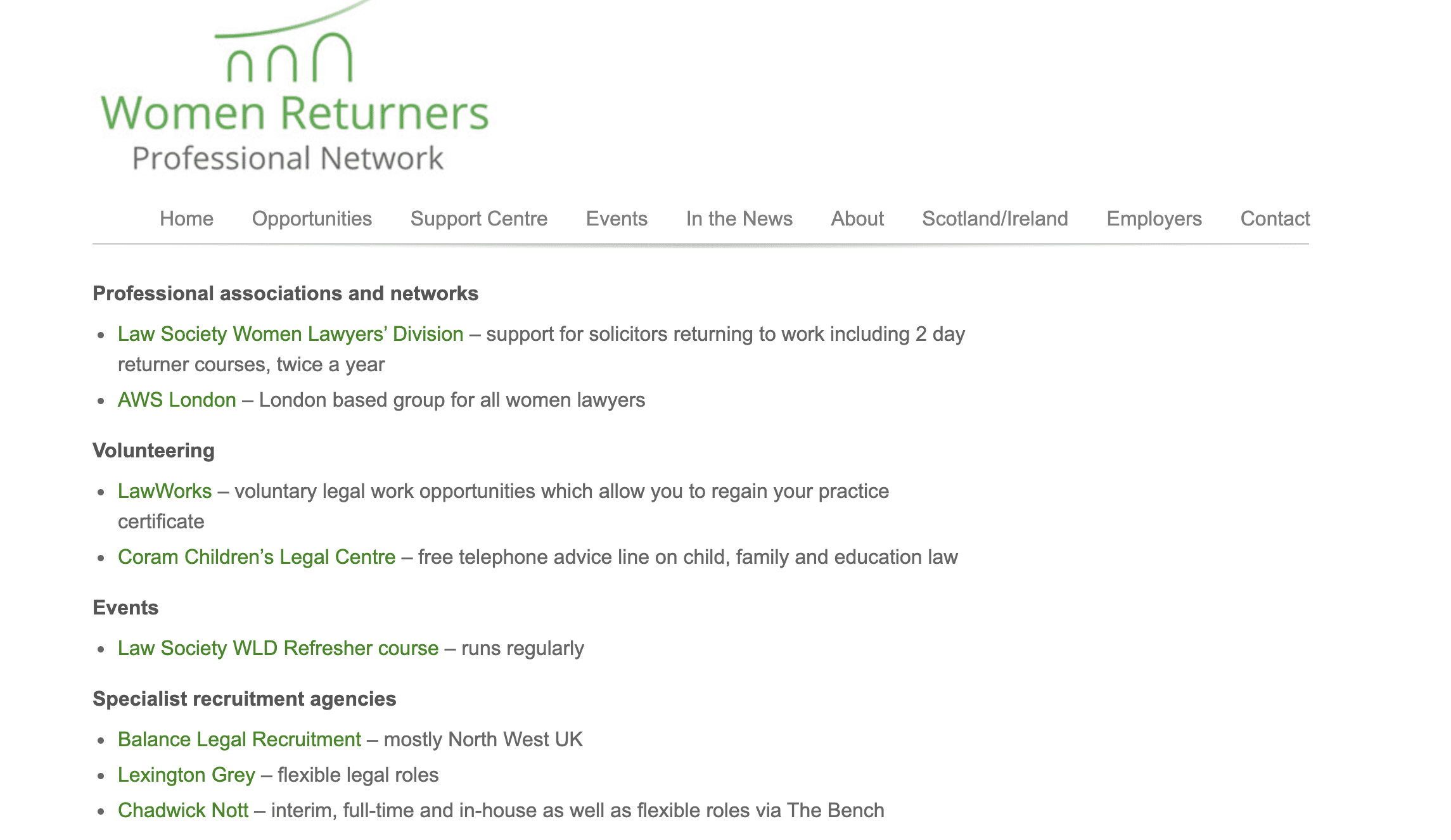
Many prominent websites enjoy creating resource pages that enable audiences to discover more content that’s relevant to the subjects covered. For example, a travel writing website may feature a page that contains links to like-minded blogs or favoured package holiday sites; while a pet-focused website may have a page containing useful links for online dog food stores.
Resource page link building is a highly effective way of building traffic to your website without the need of relying solely on fresh content. This way of link building is great for boosting your rankings without committing too many working hours to the task. Simply outreach to websites that you believe could benefit from linking to your content.
6. HARO & Helping Reporters
HARO is a great tool that has the potential to create very high-value links back to your website from large scale news organisations. An acronym for Help A Reporter Out, HARO enables journalists to perform callouts for help in gaining voices in articles.
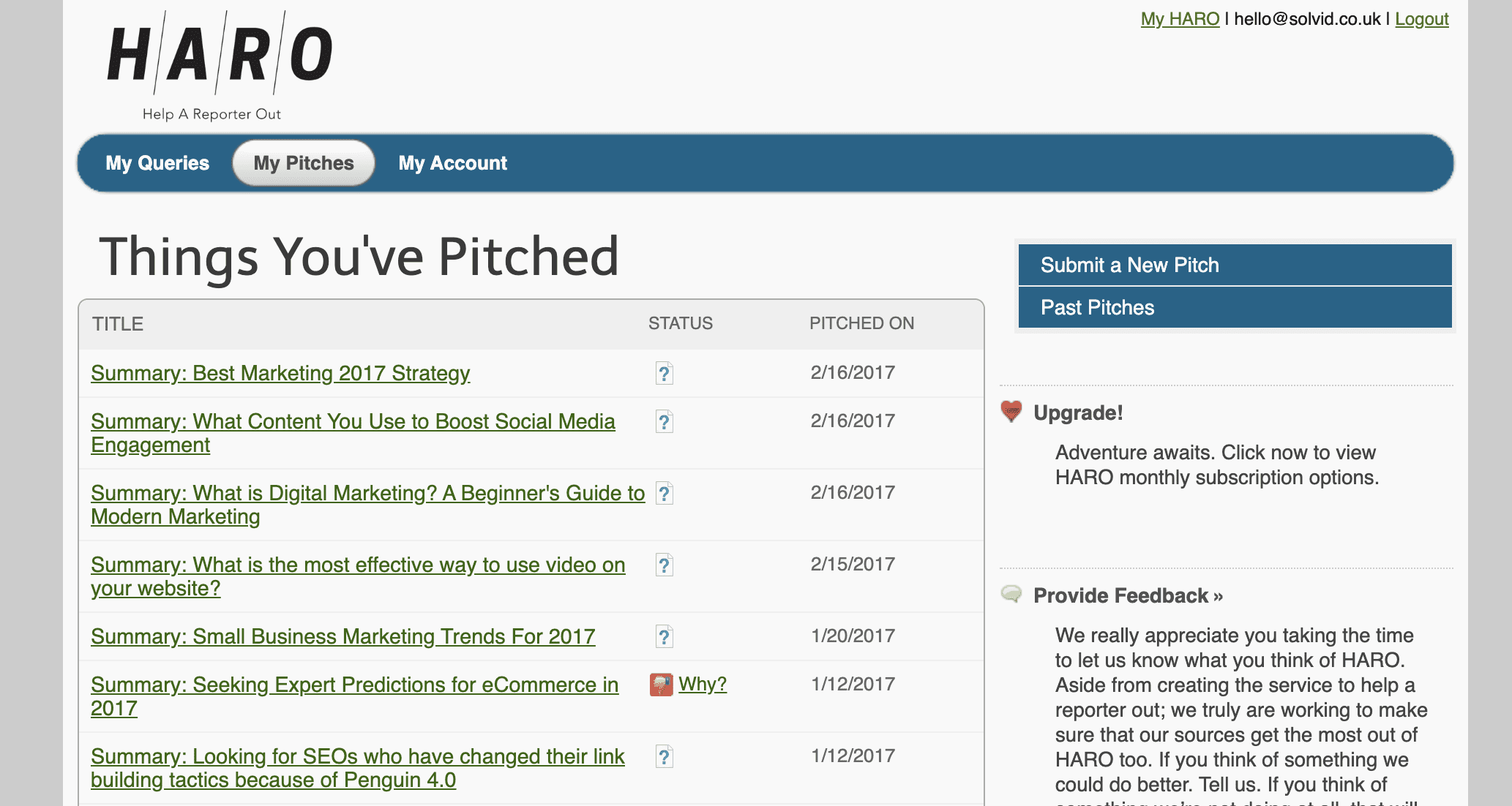
When a reporter requires an authoritative source for their content, your law firm could offer to lend your voice to the piece by pitching information for their consideration. If your quotes are picked up, your business could gain a high-quality backlink on a news domain with an excellent level of authority.
The only downside to this method is that it’s somewhat time-consuming. Pitches typically need to consist of 200 to 300 words and there’s no guarantee of your information being picked up by the reporters requesting help. With a network of over 800,000 organisations willing to connect with journalists, it pays to ensure that your insights are of the highest quality.
9. Build a Blog
It’s highly advantageous to equip your website with its own dedicated blog section. Blogs form a great platform to not only put your industry knowledge on show to your audience but also to place your organisation higher within Google’s rankings thanks to the accompanying keyword opportunities.
Your blog can help to draw in a range of different audiences and prospective clients based on the subject areas that you cover. In such a vastly competitive industry as law, it can sometimes be difficult to find ways to keep up with the field’s leading websites, but through effective and high-quality blogging, you can certainly build a more unique level of appeal to your target audience.
10. Optimise your meta tags
On-page SEO can sometimes feel like more trouble than it’s worth. You’ve already created your content, so why should you focus on a series of distracting administrative tasks before publishing your piece?
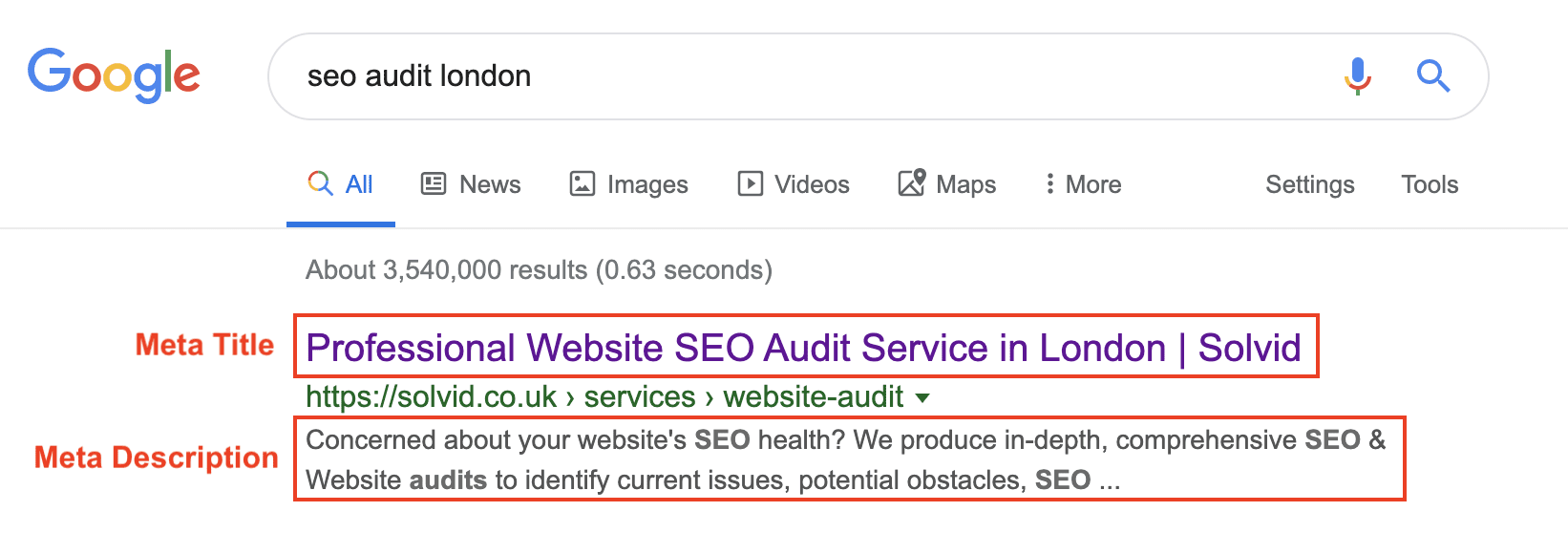
Well, meta-tags and other forms of post-production SEO can make all the difference in building your visibility online. The most important aspect of on-page SEO is your meta-tags. These tags are used in a different variety of ways – all of which are to tell search engine crawlers (and the readers) accessing your site what the specific page is all about. One key meta tag is the page title. Editing your page title gives you full control of how users and search engines see your page. A tested approach to your page title is to keep your meta title between 55-65 characters, ensuring that it’s the same as your post title.
Your meta description is the space below your heading is search results, and is aimed at giving the users a brief description of the post/page.
Appropriate heading tags (H1-H6) play a significant role in breaking articles up and making the information on the page easier to digest. Yoast SEO is one organisation, in particular, that’s keen to help customers master their approaches. Yoast also offers automatically created sitemaps that help make your pages discoverable on Google.
11. Ensure that your content tackles high-volume, low competition keywords
Here, we’re looking at some great, low-difficulty, high-volume keywords:
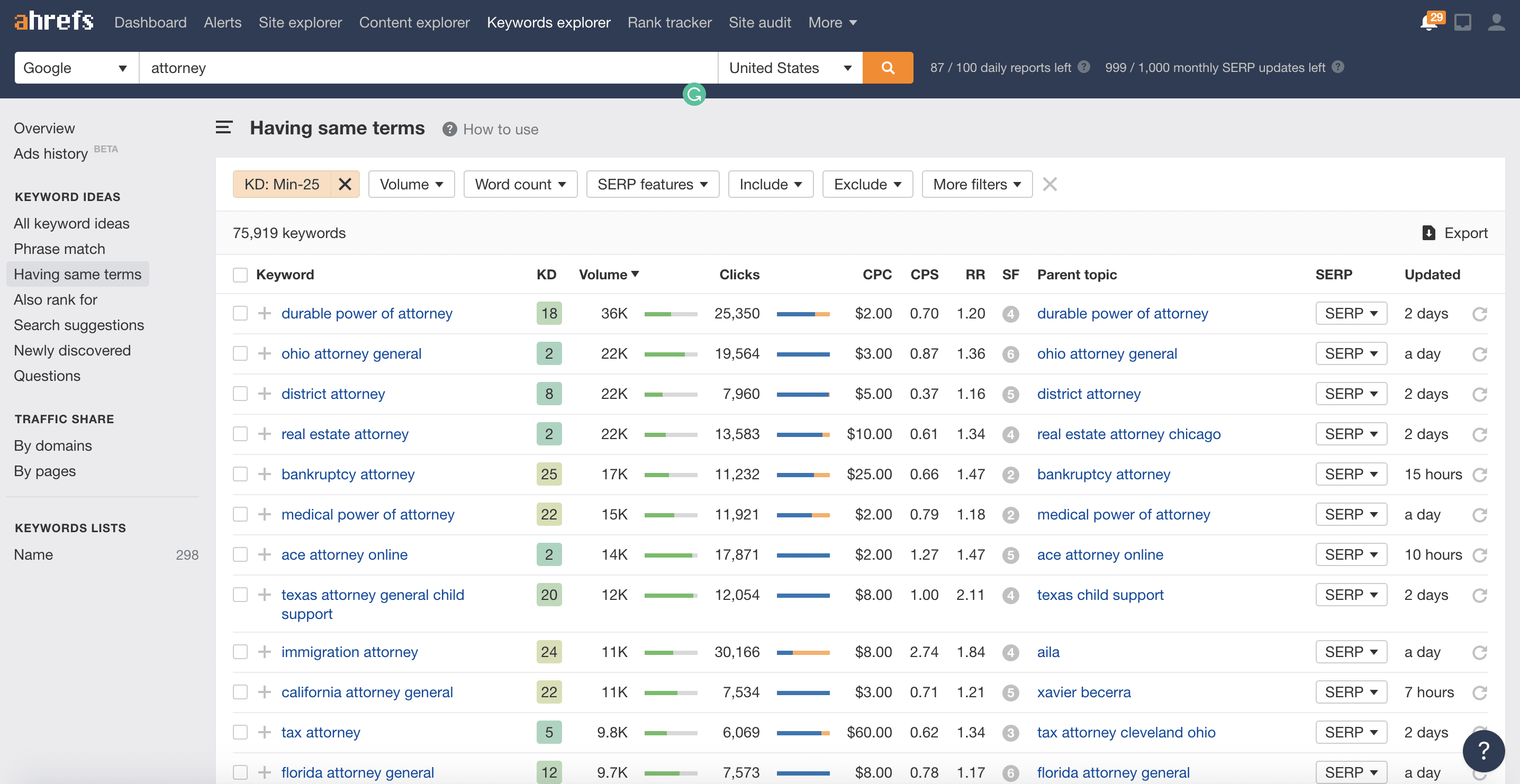
This guide has made no secret of the value of keywords when it comes to SEO, and there’s something of an art behind choosing the right ones to focus on when producing content.
When you’re looking to optimise your content, there’s little point in utilising highly competitive keywords unless your domain authority is on a similar scale to CNN. For many developing companies and startups, the best practice is to identify niche topics that few established businesses have covered.
Services like SEMrush and Ahrefs make for great tools in identifying the keywords that users are searching for. Browsing queries on Quora’s can provide a great insight into the sort of subjects you can cover.
If you find a recurring question that’s being asked by multiple people without much supplementary coverage, you may well have found something to exploit within your content. Finding high-volume, low competition keywords can make a significant difference in vying for attention online and enjoying a regular stream of traffic.
12. Craft content that answers questions and satisfies searcher’s intent
It’s important to remember that the fundamental purpose of search engines is to scour the internet for answers to users’ queries. Too many figures in the SEO game are quick to forget that those who are navigating to their website are typically looking for answers.
Make sure you craft your content in a way that leaves no stone unturned. If you produce an article that focuses on ‘the problems posed by law in the age of GDPR’, be sure to highlight specific issues and offer accompanying solutions. Doing so can make all the difference between your law firm’s website simply containing waffle or possessing high-quality content.
13. Interactive Content
Numbers have never been too interesting to the internet as far as the search engine behemoths of Google and Yahoo are concerned. Interactive visualisations, however, are like gold dust to SEO practitioners.
Readable and user-friendly visualisations of content can work wonders for your website’s user experience model, and prevent bouncebacks from visitors who find themselves bewildered by the sheer volume of data that they’re being bombarded with. If a picture paints a thousand words, imagine what an infographic does for raw data.
As a law firm, you’ll no doubt be in possession of piles of data concerning a range of subjects. The industry is ripe for visualisations and by converting emerging trends and quirky facts into an infographic, you can appeal to a significantly larger audience that’s looking for tangible data on a given topic.
The great thing about infographics is that they make raw data visually appealing – so much so that they attract backlinks naturally.
14. Pictures can make a world of difference
Although it may not seem like the most natural practice for a law firm, you should always be looking at including pictures in your content. The visual appeal of images helps to break up large passages of content and effectively gives the reader some respite – encouraging them to spend more time on your business’s pages.
Incorporating images in your articles can significantly benefit your technical SEO. Industry giants, Yoast, explains: “What’s more, since visual search is getting increasingly important — as seen in Google’s vision for the future of search — it could turn out to provide you with a nice bit of traffic. If you have visual content it might make sense to put image SEO a bit higher on your to-do list.”
Although images aren’t integral in law as they are in, say, e-commerce, there’s still plenty of mise-en-scene that can be built through effective pictorial props. Utilising images effectively has the potential to provide some much-needed context to a data-heavy article.
15. Directories and Citations
There’s not much point in crafting quality content and working on your brand’s reach if prospective clients aren’t able to figure out your business’s contact and locational information.
Directories and citations help to make your digital presence a little bit more tangible. Be sure to include your business telephone number and location listed on Google and social media platforms like Facebook, Twitter and Instagram.
Essentially citations help internet users to discover more local businesses and pay a significant role in optimising your local search engine rankings. It’s important to ensure that citations are consistent and correct for potential customers at all times.
It’s also highly advantageous that your business is listed on local directories like Google My Business, Bing Places, Yahoo and Yelp.
16. Answer law’s frequently asked questions (using Quora and forums, etc.)
The importance of answering frequently asked questions may have been featured in parts of this guide before, but it’s certainly worth emphasising within its own section.
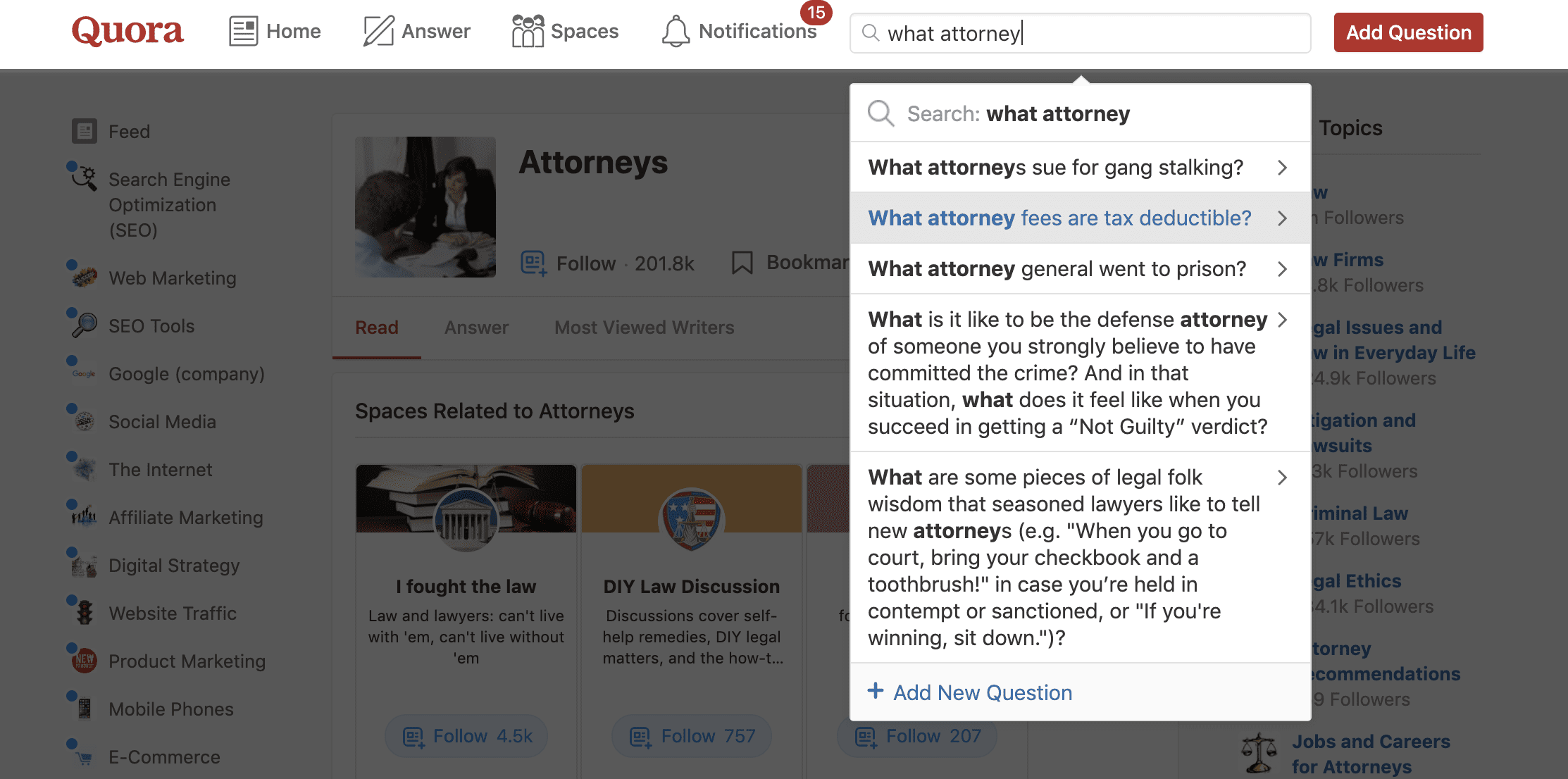
The most effective approach your content can take is from the angle of answering the questions that your competitors have so far failed to address. Such a strategy requires a deep scrub of question and answer platforms like Quora and social media – as well as the FAQ pages of law websites that have been negligible in providing workable solutions to visitors.
Allocate some time for hunting down pertinent questions that have been repeatedly asked over large periods of time until a relatively recent date. This indicates that your solutions would command a steady flow of traffic long into the future – helping to futureproof your business.
17. React to relevant trending news stories
Nothing trends better and captures peoples’ attention better than a breaking news story, and when it comes to the law, we’re never too far away from finding relevant column inches. Social media presences such as Twitter’s @BarristerSecret has amassed a seismic following of almost 200,000 followers thanks to offering candid insights into developing and divisive news stories, and the industry’s ripe for further reaction and insight.

At the time of writing, the highly emotive and controversial legal row over the citizenship of Shamima Begum – a British woman who joined ISIS before fleeing to seek refuge in the UK for both herself and her newborn baby – has been a significant draw for audiences worldwide. One Guardian piece on the breaking story in February 2019 drew almost 8,000 references from across social media. Given the unprecedented and exceptional nature of such stories, valuable and high-quality insight from reputable sources can be a draw for audiences wishing to learn more and gain more in-depth knowledge on the subject.
18. Demonstrate your expertise and build trust (Google reviews, testimonials, etc.)
Solicitors are expensive, so clients will be keen to know that the law firm they’re spending money on are highly reputable and trustworthy.

SEO is a vital component in developing trust between companies and customers. Quality content works great in demonstrating your industry expertise as well as feeding useful information to prospective clients, for free.
By providing quality content, you’ll continue to build trust and respect for your organisation – even if many of your visitors never make the decision to hire any lawyers.
19. Dedicate time to internal linking
We’ve dedicated much of this guide to generating effective backlinks for your content but we’ve rarely touched upon the importance of internal linking. It’s essential practice in SEO to ensure that all of your website’s pages are interlinked well to ensure ease of reference and navigation.

They not only help users find their way through your pages with relative ease, but high-quality internal links also help search engine crawlers to better understand the structure of your website. If some of your pages are poorly interlinked within your site, Google may struggle to piece your pages together properly.
20. Invite discussion within your posts and build a community
Sometimes the biggest draw for a website has nothing to do with its developers, authors or editors. Comments sections of blogs are often undervalued by businesses but can play a vital role in building a vibrant community that generates user-created content.

User-created content can come in the form of visitors choosing to discuss a published article further and their comment can contribute to the quality of keywords that a page possesses when Google considers its value among its results pages.
As law can be such an emotive subject, be sure to invite discussion in the comments section below posts. The beauty of building a space for users to comment is that it will give visitors a reason to return to your website.
21. Respond to your reviews
Reviews perform a vital service that many internet users rely on. When we go shopping online, we’re looking for highly-rated products from our peers, and the same goes for users looking to enlist the best solicitors.
Because law’s so competitive, having high user reviews is extremely advantageous. However, sometimes it’s not always possible to keep everyone happy – especially if you’re a developing company without a vast quantity of staff to utilise.
Always make time to respond to your reviews, especially your negative ones. If a customer has a poor experience, it’s vital that you’re seen to care about their frustrations and endeavour to correct any errors that were made.
Google’s reviews are seen by scores of prospective clients, so it’s vital to ensure that your ratings are as favourable as possible (ideally four or five stars), however platforms like Yelp and Avvo should also be managed accordingly to ensure your ratings are as positive as can be.
22. Monitor your progress
You’re missing out if you’ve not taken a moment to step back and watch your progress after pouring your blood, sweat and tears into utilising an effective SEO strategy.
The path towards SEO glory is usually a very poorly paved one, and there are plenty of potential areas where you can trip and slip up, so keeping an eye on your progress is vital in making sure that you’re either on the right track or identifying any potential problems as early as possible.
Perhaps you’ve failed to include a healthy level of internal links in your content? Or maybe some of your published posts aren’t ranking very highly due to a lack of quality keywords? Maintaining a regular insight into your website’s SEO performance is vital in navigating your way over a tricky path to success.
Tracking tools like Google Webmaster Tools, Google Analytics and any number of available search rankings tracking software can do an excellent job in showing exactly where your website’s excelling and where it’s lagging in comparison to competitors. You can also track your progress manually through Google AdWords Preview Tool and see various listings in specific localised areas.
Full Disclosure: This post may contain affiliate links, which means that if you purchase or sign-up with one of the services, we may receive a commission.
Law Firm SEO FAQ
[sc_fs_multi_faq headline-0=”h3″ question-0=”Does my Law Firm need SEO?” answer-0=”Every business that is trying to make an impact online needs SEO. At the end of the day, people find and make decisions through Google.” image-0=”” headline-1=”h3″ question-1=”How to rank my Law Firm?” answer-1=”There’re many components to ranking any website. However, it’s even more challenging when it comes to very competitive industries like legal services. Start with a proper SEO audit, followed by on-page and technical optimisation. You can then proceed to create quality internal and external content, link building and guest blogging.” image-1=”” headline-2=”h3″ question-2=”Why is law firm SEO so expensive?” answer-2=”Legal services is an extremely competitive niche, with PPC pricing shooting up to as much as $120/click. Hence, ranking a website in competitive niche will require a lot more time and effort, thus more billable hours.” image-2=”” headline-3=”h3″ question-3=”How to build backlinks to a Law Firm?” answer-3=”There’re numerous strategies, including guest blogging, broken link building, outreach, resource pages link building and skyscraper technique.” image-3=”” count=”4″ html=”true” css_class=””]

